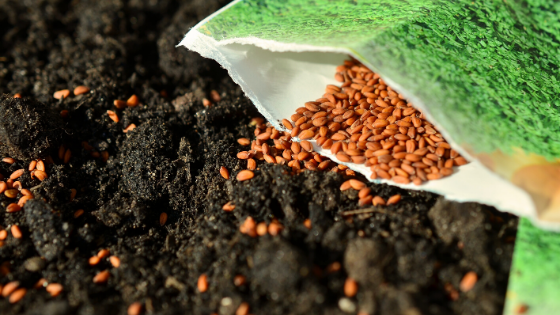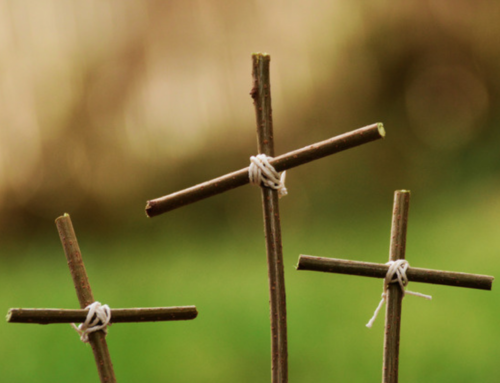I have always dreamed of becoming a farmer.
Home-grown eggplant. Vine-ripened tomatoes. Juicy strawberries hand-picked after soaking in the sunshine.
Who could ask for more?
The epitome of achievement, satisfaction, tranquility, prosperity I’m convinced lies in joining the green-thumb club. In tasting the fruits of your own labor. In eating the bounty of your own harvest. Pure abounding joy, I say!
Then why am I not out right now tilling some soil? Why am I not scattering some seed? Why is my greatest gardening attempt a single avocado pit suspended with toothpicks in a water-filled juice glass on the shelf above my kitchen sink?
Because farming is hard work.
Time-consuming, trying, risk-taking work.
Kind of like the work that comes for many of us in sharing the gospel. In intentionally, purposefully communicating with others about Jesus through our words, our actions, our lives.
We just don’t all have green thumbs.
Fortunately, Jesus knew full and well the tough reality of evangelism. The resistance, opposition, misunderstanding, rejection that can potentially come when we choose to share how “God so loved the world” (John 3:16 NIV). He experienced the rebuffing Himself. His hands held gospel seeds.
And this is why in Matthew 13 Jesus compassionately tells His disciples the parable of the sower. It’s a story meant to speak directly to that evangelistic hardship, to that risk-taking work of sharing the gospel. It’s meant to ease the load, to uplift and offer comfort to you and me and every other budding, unsteady gardener of souls.
Yet few seem to see it in this light.
Few see the Son’s rays shining through. Few realize His lavishing, overpowering love pouring out like a steady shower of rain. The love of the farmer. The love of Jesus Himself. That’s what it’s all about.
So, let’s take another look.
“A farmer went out to sow his seed. As he was scattering the seed, some fell along the path, and the birds come and ate it up. Some fell on rocky places, where it did not have much soil. It sprang up quickly, because the soil was shallow. But when the sun came up, the plants were scorched, and they withered because they had no root. Other seed fell among the thorns, which grew up and choked the plants. Still other seed fell on good soil, where it produced a crop—a hundred, sixty or thirty times what was sown” (Matthew 13:3-8 NIV).
As you first read this parable, you may be tempted to see how many people see.
With eyes to the ground.
I mean the seed scattering has obviously run afoul here. Seeds are going every which way on all types of dirt where they clearly produce no fruit. What a waste. And because of this, it’s easy to assume (and many do) that Jesus’ point is this farmer is somehow lacking. A bad gardener? No green thumb? Good seed, after all, belongs in good soil and not in these other uncultivated areas, right?
No. I don’t think so.
I don’t think that’s what Jesus is saying here at all. Jesus’ intentions aren’t to suggest the farmer—you and I—are somehow inferior in our gospel gardening work. Nor is He trying to tell us the farmer should do better. That He should judge first. That he should stop and carefully examine the propagative possibilities of human soil before selecting, correspondingly, where and when to scatter seed.
Sheer poppycock.
These different types of soil, after all, represent people’s hearts. Moreover, they represent each person’s readiness (or lack thereof) to hear and receive His gospel message (see Matthew 13:16-23). Some people who hear the gospel lack understanding. Some have no roots. Some choke on worry so much it keeps the good news from getting down into the deep places in their souls.
But they are all still people God has created.
Every one of them.
They are individuals He loves deeply. They are men, women, and children He cares exceedingly for, just as much as He cares for those with “good soil” hearts. What does this story mean then? How does it express Jesus’ all-surpassing love and offer hope to you and me and every other spiritual sower?
The answer lies in the context, I think.
Jesus’ parable comes on the heels of a crazy day of ministry (see Matthew 12). Numerous healings take place, prophecies are fulfilled, a startling exorcism occurs. How dramatic that must have been.
This day, however, was not all glamour and glory. Jesus experiences intense persecution. He’s accused of breaking Sabbath law. He’s suspected of colluding with Satan. He’s condemned for not producing miracles on command like a magician. To top it off, Jesus’ own family shows up demanding his attention. They want to cajole him into silence. To stop His healing, end His helping, desist His sharing of the gospel message.
Within this context, how do you think Jesus would feel?
What heaviness, frustration, rejection He must have held in His heart that day. What emotional pain must have welled up inside of Him, pouring out through the lines on His face, the look in His eyes, the sound of His voice.
His disciples saw it.
The emotional whiplash, the ugly side of ministry. They had walked with Him day in and day out and, therefore, must have seen firsthand the struggle of spreading Jesus’ good-news message. They were primed to receive this parable. They were prepared so much more than we are today.
They stood right next to Jesus, after all, in Matthew 13:1-3 as He goes down to the lake while the bustling crowds follow. They see as He climbs into a boat along the water’s edge, as He stands on that wobbly, bowed makeshift platform so that all the people can hear.
They listen as he talks about a farmer.
About a man they do not know. About a man Jesus desperately wants them to know. This farmer loves the harvest, you see. He loves it so much he willingly scatters his seed everywhere—in good soil, on dry paths, on rocky places, among the thorns.
He doesn’t care.
Anywhere this farmer can reach, he scatters in blind yet purposeful hope the harvest will one day come. This gardener loves so extravagantly, so excessively, in fact, what appears to us as flagrant scattering is worth the cost for him.
It’s worth every penny.
This farmer, you see, embodies the heart of Jesus Himself. He’s the One who loves lavishly. The One who loves wastefully, inefficiently, nonsensically (at least it seems so from our earthly vantage points). Jesus loves the hearts of all people no matter how dry, how distracted, how thorny or cracked. He loves beyond the threat of persecution and in spite of fruitlessness.
He simply loves.
That’s who He is. That’s what Jesus does.
And that is such a comforting thought.
So next time your own sowing gets hard, the next time you question whether your thumb is green or brown because you see no fruit from your labor, stop and consider His love. Take another look at this parable and remember “we love because he first loved us” (1 John 4:19). His love waters our love. His love shines through us to others.
Then listen to Jesus softly whisper these words:
Have courage, dear farmer. Take heart and do not be dismayed. I’ve been there. I know gardening is hard work. But keep at it. Keep scattering seed.
Anywhere. Everywhere. All of the time.
Because even when three-fourths of your seed falls haphazardly to the ground, your effort is not lost. Your work is not in vain. My harvest will come. A hundred, sixty, or thirty times what is sown.
“I planted the seed, Apollos watered it, but God has been making it grow.”
1 Corinthians 3:6







Loved this very wise teaching! Great point about Jesus doing the hard work too. We often forget He met us in our humanness and relates to us so well. This is encouraging- spurring is to continue on!